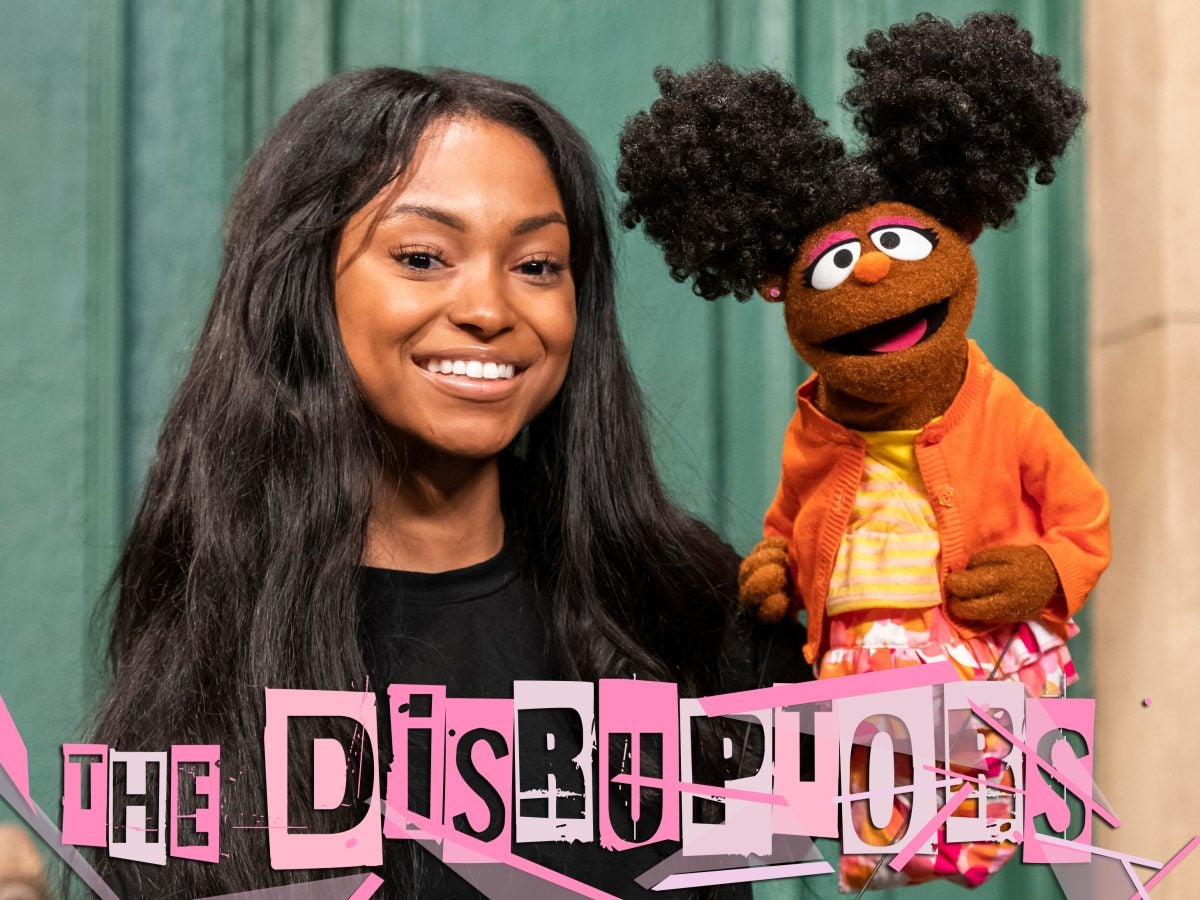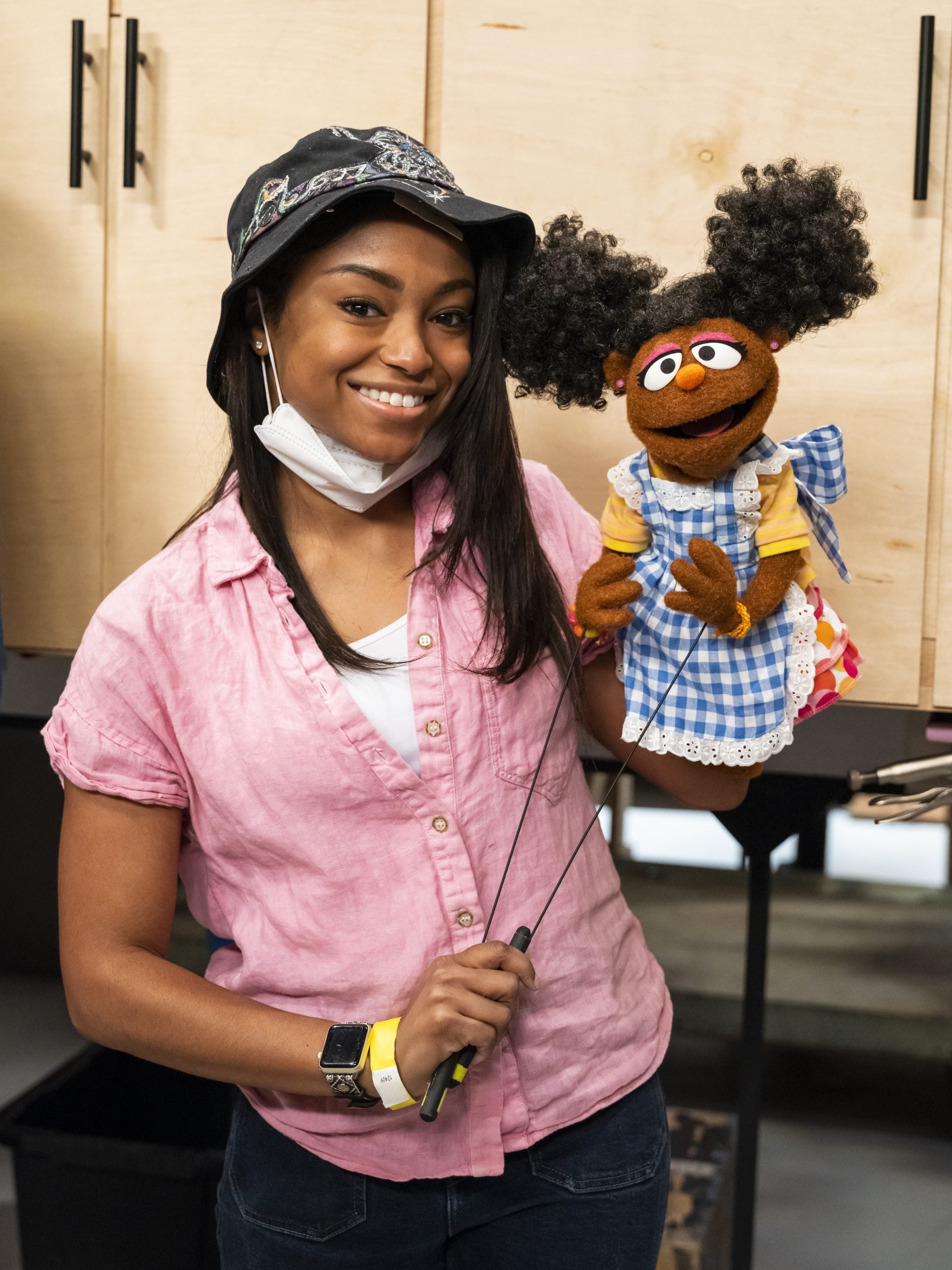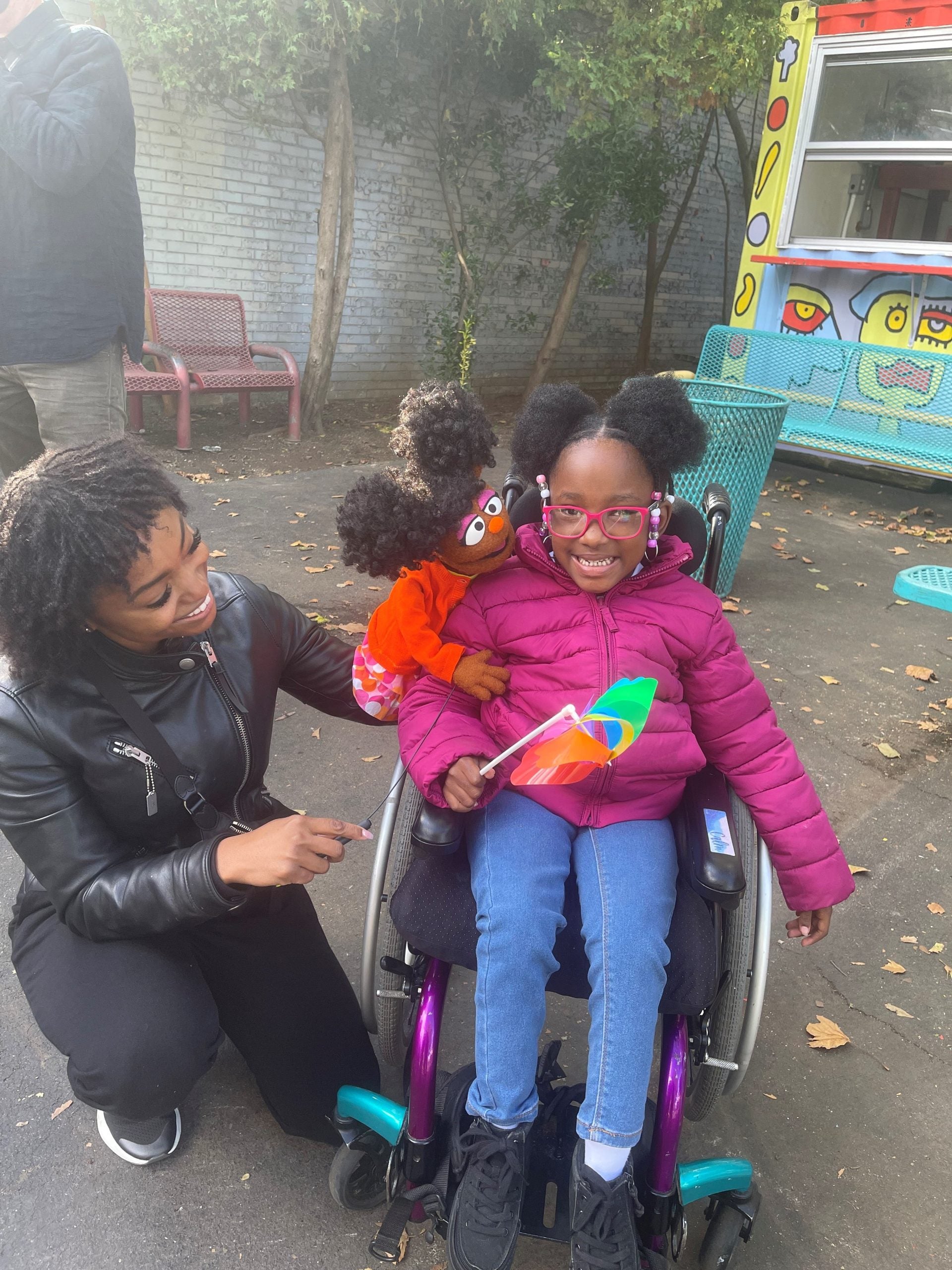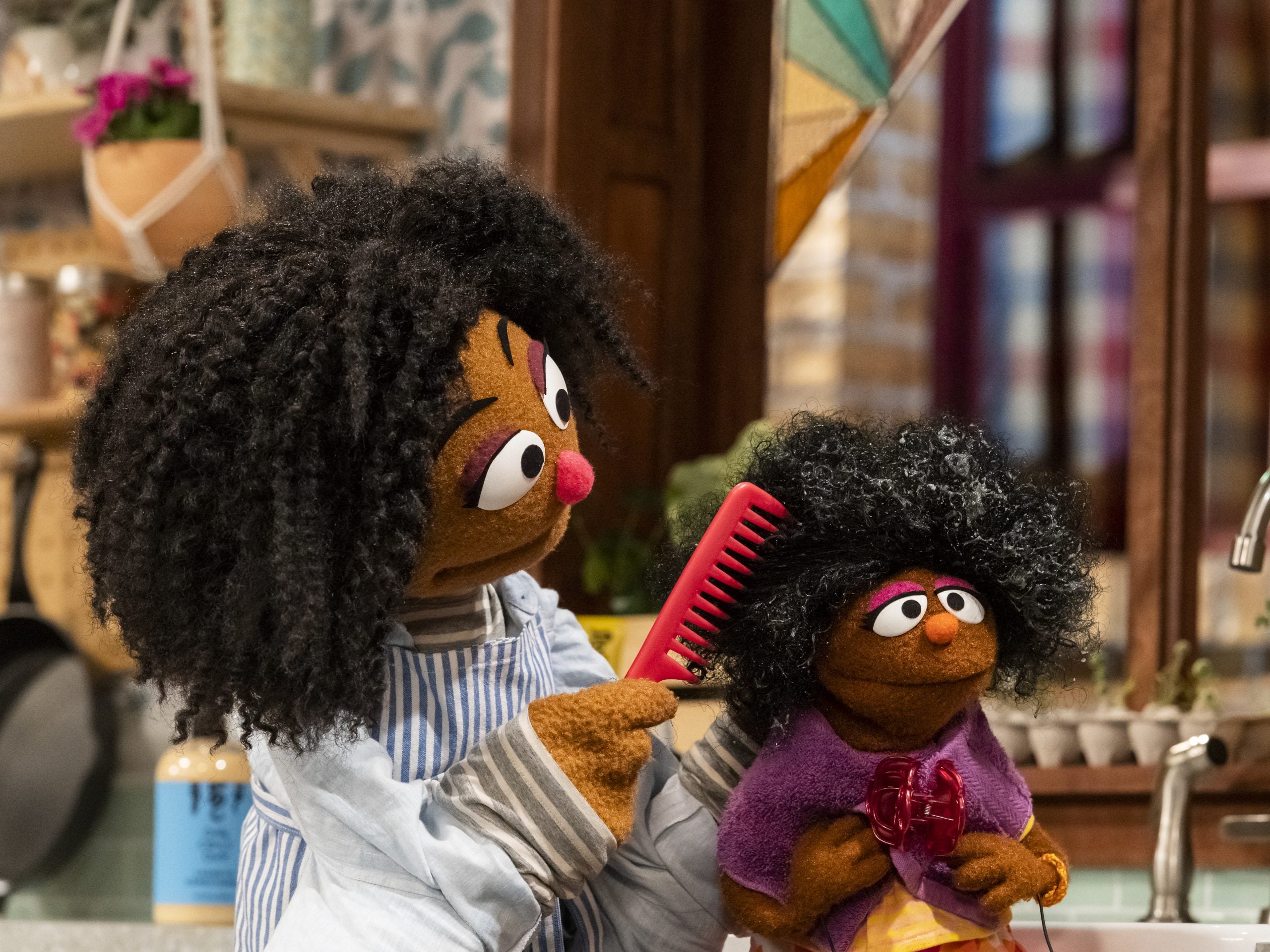
The Disruptors is a series for Women’s History Month spotlighting Black women who are blazing trails in spaces that aren’t often filled with women who look like us. These are their stories of how they took up space and are making an impact for those coming behind them.
Long before Megan Piphus Peace was giving voice to the puppet of Gabrielle on Sesame Street, the first full-time Black woman puppeteer in the series’ more than 50 years, she was first introduced to puppetry and ventriloquism as a child watching the show, among a few other classics.
“Earliest puppetry memories? Watching Sesame Street and Mr. Rogers and Shari Lewis and Barney,” she tells ESSENCE. “But I didn’t know it as an art form until I was 10 years old and I started on a puppetry team at my church.”
A young Megan first got to try puppeteering with help from a woman who did the vacation Bible school program at her house of worship. That woman signed her, and a few other students, up for a festival (the International Festival of Christian Puppetry and Ventriloquism) to be formally trained. Puppetry is when the performer or puppeteer is hidden, while a ventriloquist performs as both puppeteer and actor.
“I was exposed to puppeteers from all over the world and ventriloquists too. I fell in love with the interaction between the human and the puppet because that’s the entertainment I grew up watching,” she recalls. “I was inspired to be that person who was creating that magical relationship with the puppet.”
She shared that desire with her parents and they helped her find a puppet and VHS tapes on how to do ventriloquism. It paid off quickly. “Within like a week, I was cracking jokes with my classmates during our breaks with my new puppet.”
Her love of puppeteering and ventriloquism only grew as she got older. She found herself performing across America, hoping it would be something she could use to make a living.
“I always dreamed of having a career in puppetry, but unfortunately, there weren’t that many opportunities for me to become a full-time puppeteer when I was coming straight out of college,” she says. “I performed throughout the country while I was in undergrad, did The Tonight Show and America’s Got Talent. I hoped those opportunities would lead to a full-time position but they didn’t.”
So she did it as a hobby while studying in school to nurture her creative side, while earning a master of science degree in finance to tap into her quantitative financial side. Still, she didn’t give up on her original dream after college. She continued performing on the weekends and practicing in the early morning while working a full-time job. It wasn’t until 2020 that her big break came out of the blue with a simple email.

“I was six weeks pregnant with my second son and my oldest son was about 18 months. I got an email from a producer on Sesame Street who was also a puppet captain who said, ‘We saw your tapes from a few years ago’ that I submitted through a friend already on the show. ‘We stopped production because of the pandemic and had the chance to go through old submissions. We were wondering if you would like to learn our style of puppetry?’ I was willing to learn and do so outside of my full-time job.”
She worked with puppeteers, including Matt Vogel (who voices Big bird, among other iconic characters) who trained her virtually all throughout that year. In June 2020, CNN partnered with Sesame Street for a townhall to help families discuss racism and Peace found herself doing her most important work yet.
“Gabrielle got to be part of the community discussion to help kids understand what was happening,” she says. The next year, she, and Gabrielle, were made full-time members of the Sesame Street team. She became the first full-time Black woman puppeteer on the series.
“I think it’s very important to have diverse perspectives that are not only humans on the show but are a part of the puppets,” Peace says. “I think Gabrielle deserves to have a backstory and perspective that is reflective of many kids across America; that’s reflective of experiences I faced as a child; that’s reflective of my community as a child and my culture and my experience of America. So it’s incredibly important that the humans on the show and the puppets on the show reflect children of every background.”

The response from kids to Gabrielle, with her afro puffs and dark brown complexion, has been “fulfilling” for Peace. She has had the chance to interact with children in person with the puppet. She’s also started doing puppetry workshops to help other young kids get into the art form, including through the organization Saving our Daughters. It mentors elementary and middle school girls interested in the arts. She’s also training other Black women to get into puppeteering.
“There aren’t many women of color in puppetry but it has grown,” she says. “Sesame Street has been a force behind that, going out and seeking diversity. We’ve had workshops with women who may be voiceover actresses, actresses to see if they’re interested in learning Muppet-style puppetry. Now we have more puppeteers of color who’ve been brought on by Sesame Street to represent these characters.”
Not only is she excited to help bring more color to the field, she’s happy to be bringing the type of stories and scenarios she needed as a kid to young Black children of today.
“Sometimes we record episodes and I just wish I could have grown up with it,” she says. “One of the recent episodes was called ‘Wash Day.’ Gabrielle explains why wash day is an important part of her week and why it’s an important time she gets to spend with her aunt. And she shares what the process actually is: how her hair is curly, why it needs to be detangled, how she gets to pick out styles, what makes her hair special. My hair is something I struggled with as a child, so I’m glad I get to create that for other generations.”

When asked about being a “disruptor” and the importance of having Black women take up space as puppeteers, Peace says it’s incredibly important for us to be represented in the specific space of children’s entertainment.
“The audience we have with Sesame Street is in the very early childhood development phase. They’re learning basic principles like kindness, respect and community. When we think about those principles, we want them to be told from diverse perspectives,” says Peace. “So it’s important for Black women to not just be the performers but be in the writer’s room, be executives, be directors, be producers. So I’m hoping with my involvement, I can encourage Black women to pursue the careers of their dreams, no matter how niche or specific they are. Pursue your unique gifts and know there’s a need for your voice in whatever that space is.”





